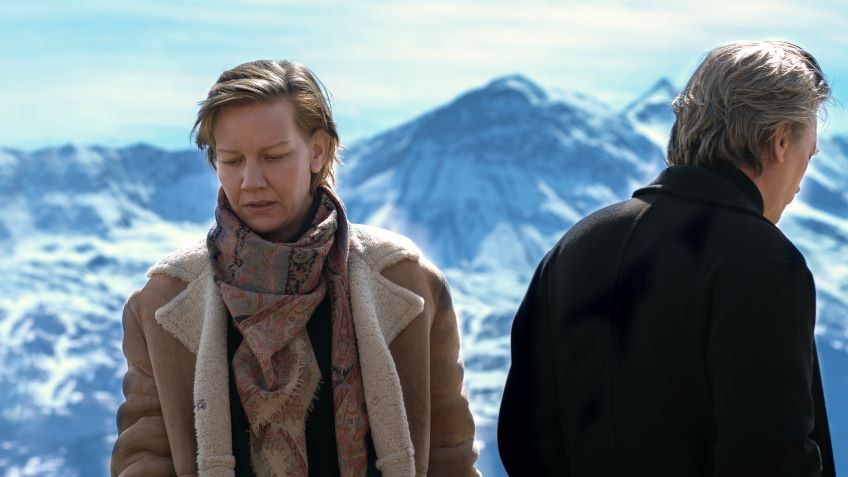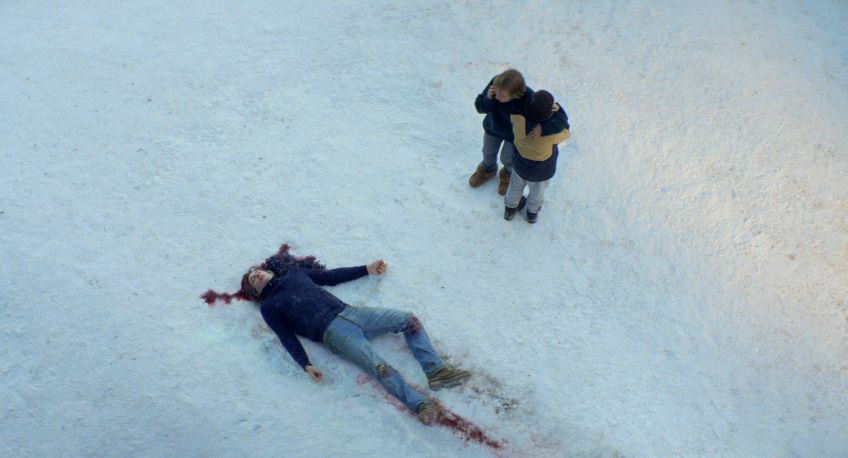Joyce Glasser reviews Anatomy of a Fall (November 10, 2023) Cert 15, 2023
From the cryptic title to the last minute of Justine Triet’s psychological thriller, the 150 minutes speed by on an unrelenting tension in which ambiguity plays a key role. In some films, doubt and uncertainty string the frustrated viewer along and feel like a cop out; but Triet, and her co-writer and partner Arthur Harari, embed it in their characters, making it so integral to everything from the cinematography, sound and set design to the plot that you realise the unknowable is the subject of the film. You have to live with it, although it’s tough in a murder trial in which the viewer is a jurist.
In an isolated chalet in the Rhone-Alps, German author Sandra Voyter (Sandra Hüller) seems to be enjoying the attention of an attractive female journalist who is curious about the extent of the auto-fiction in her novels. Sandra calls off the interview when her French husband Samuel’s (Samuel Theis) habit of blasting music over the noise of his DIY becomes unbearable. Does he not know about her interview, or is he doing it on purpose because he does know?

Elsewhere in the wooden house that Samuel is slowly refurbishing, their sensitive, eleven-year-old, visually-impaired son Daniel (Milo Machado Grander) takes his guide dog, Snoop, for a walk along the icy slopes around the chalet. When he returns he finds his father’s body lying in the snow under his study window.
Sandra calls an ambulance, and the police arrive to investigate. Sandra’s lawyer, Vincent (Swann Arlaud), who appears to be more than a professional acquaintance, is instantly by Sandra’s side, baffled, but protective. Sandra tells the police that after cancelling the interview she went to her bedroom with earplugs to take a nap, and they must have fallen out because she was awoken by Daniel’s scream.
The police ask Daniel if his parents were arguing when he went out, and he defiantly says no. Doubt is cast on the reliability of his testimony because when the police measure the music level they point out it was too loud for him to have heard from the doorway, despite his heightened auditory sense. At the end of the trial Daniel’s fascinating testimony about his father’s state of mind will carry much more weight.
The thorough forensic investigation includes using a dummy to reconstruct the fall to determine exactly when, where and how the head bruises occurred. The police conclude Samuel had help. Vincent needs to discover why Samuel fell. He advises Sandra that she is the main suspect as Samuel was alive when Daniel went out and she was the only person in the house when he died.
This is the information, the police, the prosecution, Vincent and the viewer have to work with until a tape recording is found on which an entire acrimonious argument between Sandra and Samuel is recorded. This is a rather convenient plot device that at first seems like a lazy substitute for exposition. But if Sandra writes auto-fiction, Samuel might have been recording for inspiration; for material to use in his writing.
Far from revealing the cause of death, the recording, which is dramatised for the viewer, introduces layers of doubt because neither husband nor wife come out well.
Samuel accuses Sandra of stealing an idea he had for her new book and she accuses him of having abandoned it. He objects to bearing all the responsibilities of the marriage, like home schooling Daniel and teaching to earn extra money, claiming Sandra owes him time. But she counters that no one forced him to do either.
Vincent wants to persuade the court that suicide was the cause of death, not murder. Sandra testifies that Samuel could not handle the guilt for Daniel’s accident when he was four that resulted in damage to his optic nerve. Samuel, who took anti-depressants, never emerged from his depressive state. Is that, or is Sandra the cause of his writer’s block, his drinking and his inability to finish the chalet?
We also hear that Samuel “imposed his language on her,” bringing her to his home-turf when she was happy in London. In France she is isolated and lonely. What we hear somewhat unclearly, is physical contact, but in a recording, the perpetrator remains ambiguous. Earlier, we hear Sandra say that a scratch on her arm came from a corner of the kitchen table. The film could have been entitled, “Anatomy of a Marriage,” but the substitution of “fall” for “marriage” is more than semantics.
The French actress Virginie Elfira was Triet’s protagonist in her last two films, In Bed with Victoria and Sibyl, in which Sandra Hüller was the supporting actress. Both actresses are talented and the same age, but Triet wanted language to be a factor in the film. It is used not only to support Sandra’s contention that she was an outsider, looked down on by Samuel’s family, but to add to the ambiguity. We see how Sandra switches to English in the courtroom to have more control over her testimony.
Sandra is humanised in touching conversations with Daniel, including one where she tells Daniel that Samuel was her “soul mate” and she is not the monster the prosecution would have him believe. Yet the mother-son relationship is abstruse. At one point, Daniel tells the court that he has something important to say to the judge, he asks his mother to leave the house for the weekend before his testimony.
It is these unsettling touches, and the impossibility of drawing conclusions from the testimony, which sustain the tension and keep us involved as active participants. But it is Sandra Hüller’s controlled, confident, and at times, relaxed demeanour, even when accused of murder, that keeps us wondering. Hüller is charismatic yet her personality and physique are nondescript to the point that you might not place her as Hedwig Höss in Jonathan Glazer’s upcoming The Zone of Interest or remember her award-winning performance in the Oscar nominated, Toni Erdmann. It is Hüller’s impenetrability that we will remember here, and the skill of an actress who can convey that so naturally.




